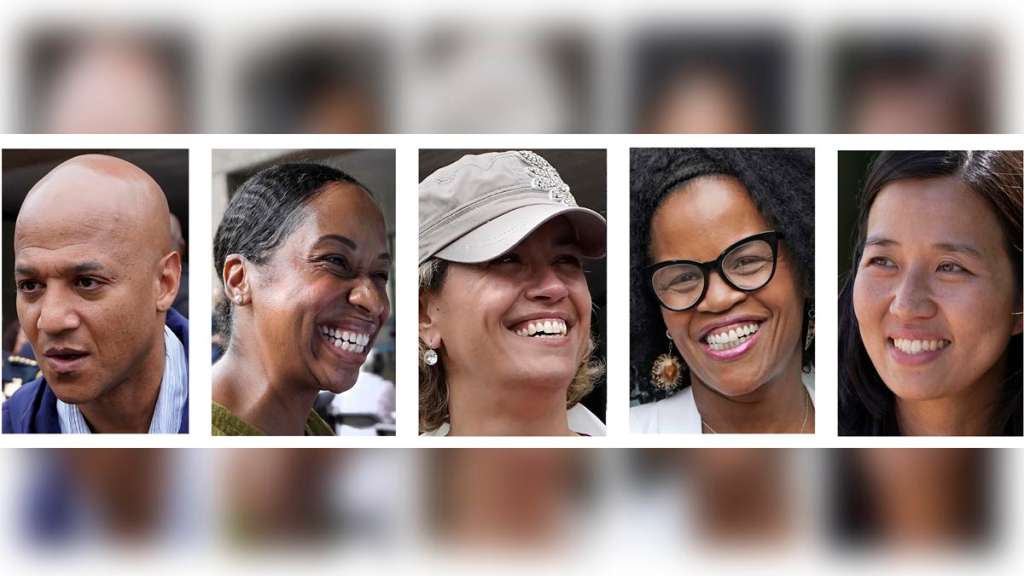BOSTON (AP) — Boston’s top mayoral hopefuls sparred on a range of topics — from education and climate change to housing affordability and public safety — during their first televised debate Wednesday, less than a week before next Tuesday’s preliminary election.
Acting Mayor Kim Janey, city councilors Annissa Essaibi George, Andrea Campbell and Michelle Wu, and John Barros, the city’s former economic development chief, faced off during the hourlong debate sponsored by NBC10 Boston, Telemundo Boston and NECN.
One of the top concerns was the city’s public school system.
As students head back to classes in what is now the third school year effected by the pandemic, the candidates agreed students, teachers and staff should continue to wear masks given the threat of the delta variant of COVID-19 and the fact children under 12 can’t yet receive vaccines.
Acting Mayor Kim Janey said she’s excited for the start of the new school year, but acknowledged many challenges remain.
“It will be difficult, but we will get through it,” she said.
The candidates discussed other, longer term problems that continue to weigh down the schools.
Michelle Wu said she would work to close the gap on early education, create a “children’s cabinet” in the mayor’s office and strengthen vocational education while Essaibi George, who taught in the public schools, said she’s committed to making sure students in “every seat in every classroom in every community have a high quality experience.”
Campbell faulted the administration for not preparing better for a potential shortage of school bus drivers. She said she was one of the parents with children in the schools who got a recorded call warning of a driver shortage.
“We should have been proactive in planning for this,” she said adding that every parent should have been reached out to individually.
Barros said the school busing program — initially meant to integrate the city’s schools and create more equality in education — has failed, including failing the families it was meant to help.
“We need to make sure every neighborhood has a quality school,” he said. “We should all be walking to our neighborhood schools.”
The five also said the city needs to do more to make sure residents can continue to live in the city in the face of soaring housing costs.
Some of the candidates, including Janey and Essaibi, said the city should focus on down payment assistance for first time homeowners, while Campbell said the city should be doing more to convert city-owned lots into affordable housing. Wu said she supports rent stabilization, a proposal that could be challenging given that rent control has been banned in Massachusetts.
“Housing is health. Housing is opportunity. Housing is safety,” Wu said.
Janey said she issued an order banning evictions during the ongoing pandemic.
The candidates also addressed the threat of climate change, not only threats to neighborhoods near the harbor but other disparities heightened by climate change like tree canopy cover between wealthier and less wealthier sections of the city.
“Climate action is so important in our city,” Essaibi George said. “We need to act quickly when it comes to environmental injustice.”
Wu said the city needs to take large and small steps to address rising heat, more frequent flooding and more intense rain — from adopting electric school buses to planting more trees.
“We need to do a whole lot more a whole lot quicker,” she said.
The candidates also said the city needs to respond to the root causes of other troubles like addiction and crime.
All the candidates are Democrats. Mayoral races in Boston do not include party primaries. The two top vote earners in the Sept. 14 preliminary election will face off Nov. 2.
The campaign marks a pivotal turning point in the city’s history. The preliminary election will almost certainly for the first time narrow the field of mayoral contenders to two candidates of color, possibly both women.
Wu’s parents immigrated to the United States from Taiwan. Janey and Campbell are Black. Essaibi George describes herself as a first generation Arab-Polish American. Barros is of Cape Verdean descent.
Throughout its history, Boston has only elected white men as mayor.
Wu has held a lead over the other top four candidates in a number of recent polls, setting up a scramble among the other contenders for the second spot if Wu’s lead holds.
Janey, who became the first Black Bostonian and first woman to occupy the city’s top office after former Mayor Marty Walsh stepped down earlier this year to become President Joe Biden’s labor secretary, has traded barbs with Campbell.
Essaibi George has also targeted Janey, who has used the higher public profile afforded by the mayor’s office to help propel her campaign. The strategy has been a double-edged sword, bringing Janey both praise and criticism.
Barros has struggled to gain traction in the contest.
Janey has raised the most campaign cash this year, bringing in more than $1.5 million since January.
Campbell, who has raised more than $1.4 million since January, followed by Wu and Essaibi George — both of whom have raised more than $1.3 million.
Barros has raised about $644,000.
(Copyright (c) 2024 The Associated Press. All Rights Reserved. This material may not be published, broadcast, rewritten, or redistributed.)

